First, find the PID of your webapp server:
ps aux | grep tomcat
Adapt the command if you are running another server than tomcat, or if you have several instances running.
Then, dump all threads of that server to a file:
jstack 12345 > jstack.txt
Where 12345 is the PID you found in the first step.
Then, look at the source code of your bundle, and find the service activator. It typically looks like this:
package fr.free.nrw;
[import section]
public class ServiceActivator implements BundleActivator {
private ServiceRegistration registration;
@Override
public void start(BundleContext context) throws Exception {
registration = context.registerService(
MyService.class.getName(), new MyServiceImpl(), null);
}
@Override
public void stop(BundleContext context) throws Exception {
registration.unregister();
}
}
Take note of:
- the namespace,
- the class name,
- the stopping method name.
For instance in the example above they are fr.free.nrw, ServiceActivator and stop, and from these three get the full name fr.free.nrw.ServiceActivator.stop.
Now open jstack.txt and search for the full name. Even though the file is thousands of lines long, there will most probably only be one hit, and that is the problematic thread:
at org.eclipse.osgi.internal.serviceregistry.ServiceRegistrationImpl.unregister(ServiceRegistrationImpl.java:222)
at fr.free.nrw.ServiceActivator.stop(ServiceActivator.java:30)
at org.eclipse.osgi.internal.framework.BundleContextImpl$4.run(BundleContextImpl.java:830)
at org.eclipse.osgi.internal.framework.BundleContextImpl$4.run(BundleContextImpl.java:1)
at java.security.AccessController.doPrivileged(Native Method)
at org.eclipse.osgi.internal.framework.BundleContextImpl.stop(BundleContextImpl.java:823)
In this file, go up to the beginning of the paragraph, which will be something like this:
"fileinstall-/home/nico/p/liferay/osgi/modules" #37 daemon prio=5 os_prio=0 tid=0x00007f39480e3000 nid=0x384f waiting on condition [0x00007f395d169000]
java.lang.Thread.State: WAITING (parking)
at sun.misc.Unsafe.park(Native Method)
- parking to wait for <0x00000000eb8defb8> (a java.util.concurrent.locks.AbstractQueuedSynchronizer$ConditionObject)
at java.util.concurrent.locks.LockSupport.park(LockSupport.java:175)
With this information in hand, you will known what kind of threading problem is going on, and you will be able to solve it with usual Java thread debugging techniques (1 2).
